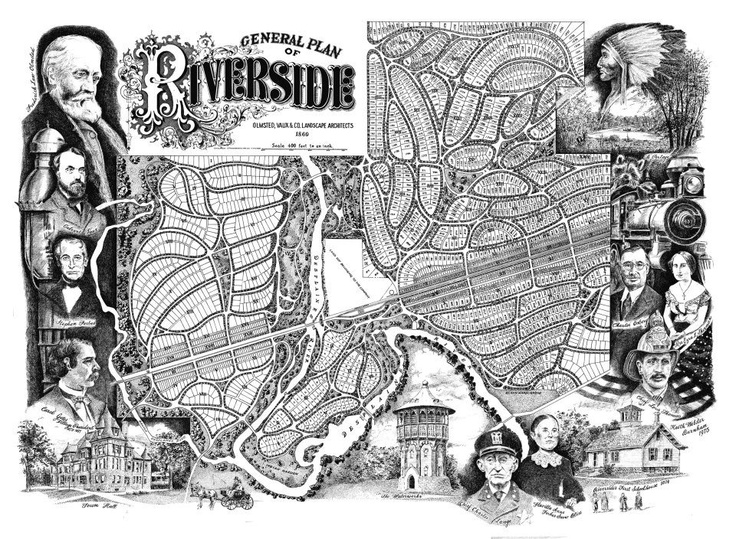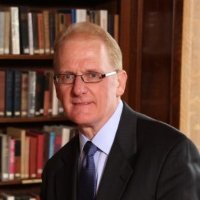|
|
|
ANNALS IN THE HISTORY OF ARCHITECTURE
The
Village of
Riverside
and Frederick
Law Olmsted:
Art and
Inspiration in
American Urban
Planning
ROBERT
F. WETHERALD
American
Institute of
Architects
The
Lounge at Iwan
Ries ---
Tuesday,
May 24,
5:30-8:30pm
Cocktails
at 5:30, with the
presentation at 6:00
for about thirty
minutes,
followed by Q&A
and general cocktail
conversation.
THE FIRST PLANNED
COMMUNITY IN THE
UNITED STATES is here
in the Chicago area,
in Riverside,
Illinois. It was
designed in 1869 and
has been on the
National Register of
Historic places since
1970.
By the time Calvert
Vaux and Frederick Law
Olmsted won the
commission to design
Riverside, in 1869,
they had already
designed New York's
Central Park eleven
years earlier, and had
designed and overseen
the development of
many prominent parks
during the decade or
so in between. Vaux
had chosen Olmsted for
the Central Park
project--even though
Olmsted had had no
previous practical
experience in
designing or
implementing a
landscaping project of
any kind--because
Olmsted was a
well-known journalist,
social critic, and
public intellectual,
and because Vaux
thought he would also
be able to make use of
Olmsted's excellent
political contacts in
New York City. Vaux's
original decision may
have been born of
practical business
matters, but, in
addition to greasing
the wheels and
explaining to the
public the philosophy
behind America's first
public city park,
Olmsted turned out to
be a powerhouse in
landscape
architecture, so much
so that Vaux's name is
little remembered by
comparison. But Vaux,
with his choice of the
younger Olmsted as his
business partner,
helped drive enormous
changes in the impetus
and direction of
landscape and urban
design in America.
Riverside (as you can
see in the street plan
below) has a very
organic layout. It is
known for streets that
wind around the
natural contours of
the hills and vales of
the land and the
meandering path of the
Des Plaines River.
Green spaces abound.
Nestled within and
around these natural
spaces are houses and
estates brilliantly
designed for their
surroundings by
residential architects
who were eager to work
in this milieu, among
them: Frank Lloyd
Wright, Daniel
Burnham, Louis
Sullivan, William Le
Baron Jenney,
Frederick Clarke
Withers, and Calvert
Vaux. Referring
to Olmsted, Burnham
said, "An artist, he
paints with lakes and
wooded slopes; with
lawns and banks and
forest covered hills;
with mountain sides
and ocean views."
Rob Wetherald, Chicago
architect and
long-time Cigar
Society member, will
talk about Olmsted's
architectural
philosophy, his design
of the Village of
Riverside, the
contributions of
various prominent
Chicago architects in
the form of estates
and public buildings
in the village, and
discuss the influence
that the planned
community of Riverside
has had on a century
and a half of American
urban planning.

Robert F.
Wetherald is
a licensed architect
and is Senior Director
of North  American
Facilities at
Oracle Corporation. He
previously held global
real estate positions
with Deutsche Bank and
Zurich Investments. American
Facilities at
Oracle Corporation. He
previously held global
real estate positions
with Deutsche Bank and
Zurich Investments.
For ten years, Rob sat
on the board of the
Frank Lloyd Wright
Trust, and he is very
proud that during his
time as chairman, the
trust acquired and
restored Frank Lloyd
Wright's Robie House,
on the campus of the
University of Chicago.
As chairman emeritus,
Rob continues his work
as a member of the
strategic planning
committee.
Rob is proud to have
been the youngest-ever
Eagle Scout in the
State of Illinois. An
enthusiastic
traveller, Rob and his
wife, Laura, love
studying the great
cities and cultures of
the world.
|
|
|
About
the
Cigar Society of
Chicago
ONE OF
THE OLDEST AND greatest
traditions of the city
clubs of Chicago is the
discussion of
intellectual, social,
legal, artistic,
historical, scientific,
musical, theatrical, and
philosophical issues in
the company of educated,
bright, and
appropriately
provocative individuals,
all under the beneficent
influence of substantial
amounts of tobacco and
spirits. The
Cigar Society of
Chicago
embraces this tradition
and extends it with its
Informal Smokers,
University Series
lectures, and Cigar
Society Dinners,
in which cigars, and
from time to time pipes
and cigarettes, appear
as an important
component of our version
of the classical
symposium. To be
included in the Cigar
Society's mailing list,
write to the secretary
at
curtis.tuckey@logicophilosophicus.org
|
|
|
|
|